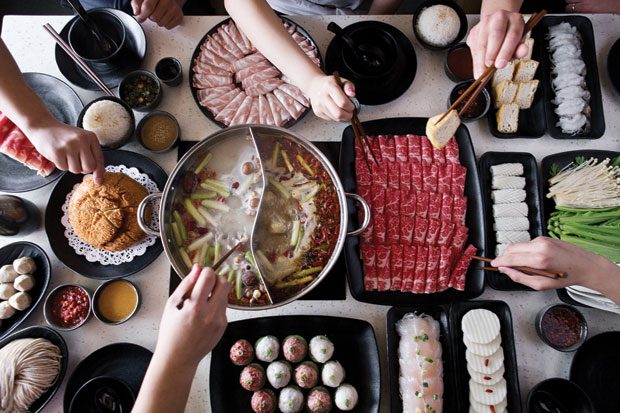
Think of it as fondue, except everyone sits around a pot of bubbling broth instead of cheese. And rather than dipping skewered bread or fruit into the steaming vat, you choose from a menu of more than 100 items, ranging from raw scallops, mussels, lamb meatballs, thin-sliced Kobe ribeye and pork kidney to winter melon, lotus root, egg dumplings and oyster mushrooms.
Welcome to Inner Mongolian hot pot, perhaps the signature dish of that autonomous region of northeast China. Inner Mongolia is not to be confused with its contiguous neighbor to the west, once known as Outer Mongolia, but since 1912 the sovereign nation of Mongolia, which has its own cuisine, thank you very much.
What’s this got to do with New Jersey? In May, Little Sheep Mongolian Hot Pot—a chain often called “the Applebee’s of China” on the Internet for its more than 5,000 Chinese locations—opened its 17th restaurant in the United States and first in New Jersey, in Edison. Ten of the 17 are in California. The only other East Coast Little Sheep opened in Flushing, Queens, in 2013.
Why Edison? “We did our research, and Edison definitely has the demographics we’re looking for,” says Peter Yang, Little Sheep’s East Coast operations manager. Speaking of Middlesex County generally, he adds, “there’s a strong Asian population and also a lot of students in the area.” Students, the 27-year-old Yang points out, are more adventurous eaters than their elders, more willing to try new things.
Mongolian hot pot is often compared to Japanese shabu-shabu, which translates as “swish-swish” and involves sitting around a pot of boiling soup and dipping thin strips of raw beef and vegetables into the liquid, then into various sauces. The difference, at least according to Yang, is that shabu-shabu “tends to be more tame, with only seaweed flavoring the broth.” Whatever the case, Little Sheep’s broth is indisputably endowed with a blend of 36 fragrant ingredients, including black cardamom pods, whole garlic cloves, goji berries and ginseng.
Nervous?
“You can dive right in,” Yang says. “Everyone on our staff is trained to teach first-timers.”
The first Little Sheep opened in 1999 in Inner Mongolia. Today, Little Sheep restaurants are uniformly large, sleek, comfortable and well lit. Tables with glassy black tops and an electromagnetic induction cooktop in the middle are arrayed in long rows, forming a perfect grid. From your seat, you may not know whether you’re in Edison, Houston, San Diego, Honolulu or Montreal (all Little Sheep locations), but you sure know you’re not in the semiarid steppes of Inner Mongolia. The soundtrack, at least in Edison, is lively (or jangly) American dance-pop.
The 6,500-square-foot Edison restaurant has 212 seats, plus two rooms for private parties. The atmosphere is fervid, with conversations bubbling in mostly Asian languages and steam billowing from the steel pot brought to each table. Many decisions must be made—first, the broth ($3.75 per person), original or spicy, the latter amped up with red chili oil and peppercorns. Can’t decide? No problem. Many tables choose half and half, served in a pot with a steel divider down the middle.
The huge, multipage, glossy menu with color photos of every ingredient is a helpful guide. On a printed sheet, you check your choices with a stubby pencil. Tiger shrimp? $4.25 a half portion, $7.95 a full portion. Goose intestine? $5.50/$9.95. Pumpkin? $3.95/$5.95.
Some items (like baby bok choy and lamb meatballs) take longer to cook than others. Mussels cook quickly. Scallops were so fresh, they could have been eaten raw. The menu also offers a range of side dishes such as five-spice edamame ($3.95) and grilled skewers of beef or chicken ($5.95). While you’re waiting for your items (service is generally quick), visit the sauce bar to stock up on various dipping sauces and condiments.
It may take a couple of visits to zero in on the items you like. One look at the color photo of pork blood, which comes in gelatinous red slabs ($3.25/$5.95), may be all Westerners can stomach, but Yang said it’s very popular with Asian customers. As for the name Little Sheep, which Americans might associate with nursery rhymes, “no one has been put off,” says Yang. “We offer lamb from New Zealand that’s grass-fed and naturally raised. We’re known for having the best lamb in the world.” 1737 Route 27, 732-626-5991
